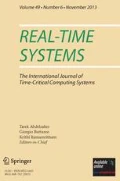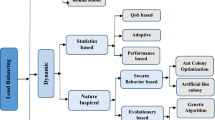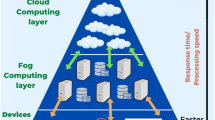Abstract
The current literature of fixed-priority scheduling algorithms relies on sufficient tests to determine if a set of mixed-criticality sporadic tasks is schedulable on a single processor. The drawback of these safe tests is their pessimism, a matter that could be solved if an exact schedulability analysis is used. However, because of the non-deterministic behavior of tasks in the mentioned setups, exact quantification of worst-case response times, needed for the test, is a difficult problem; more precisely, such a quantification needs evaluation of enormous sequences of job executions. The core problem is thus to merge such sequences to make the analysis practical. This paper, for the first time, gives an algorithm for exact worst-case response time characterization of mixed-criticality sporadic real-time tasks executing according to a given fixed-priority scheduler. We use a set of techniques which carefully consider the task properties and their relation to the worst scenarios to prune the analysis state space. We also show an interesting result that if an exact schedulability test is used, the Audsley’s optimal priority assignment algorithm is not applicable to the mixed-criticality case. Accordingly, we need new priority assignment algorithms to work with the exact test; we give a simple task priority assignment algorithm to this aim. The performance of the proposed exact test (in terms of time complexity) is examined and the effectiveness of some heuristic priority assignment algorithms using the test (in terms of the ratio of task sets which are deemed schedulable) are compared.



























Similar content being viewed by others
References
Audsley N (2001) On priority assignment in fixed priority scheduling. Inf Process Lett 79(1):39–44
Audsley N, Burns A, Richardson M, Tindell K, Wellings AJ (1993) Applying new scheduling theory to static priority pre-emptive scheduling. Softw Eng J 8(5):284–292
Baruah S (2012) Certification-cognizant scheduling of tasks with pessimistic frequency specification. In: Proceedings of the 7th international symposium on industrial embedded systems, IEEE, pp 31–38
Baruah S, Burns A (2006) Sustainable scheduling analysis. In: Proceedings of the 27th real-time systems symposium, IEEE, pp 159–168
Baruah S, Burns A (2011) Implementing mixed criticality systems in ada. In: Proceedings of international conference on reliable software technologies, Springer, New York, pp 174–188
Baruah S, Burns A (2013) Fixed-priority scheduling of dual-criticality systems. In: Proceedings of the 21st international conference on real-time networks and systems, ACM, pp 173–181
Baruah S, Guo Z (2013) Mixed criticality scheduling upon unreliable processors. Technical report, University of North Carolina at Chapel Hill, Technical report
Baruah S, Vestal S (2008) Schedulability analysis of sporadic tasks with multiple criticality specifications. In: Real-time systems, 2008. ECRTS’08. Euromicro Conference on, IEEE, pp 147–155
Baruah S, Mok A, Rosier LE (1990) Preemptively scheduling hard-real-time sporadic tasks on one processor. In: Proceedings of the 11th real-time systems symposium, IEEE, pp 182–190
Baruah S, Li H, Stougie L (2010) Towards the design of certifiable mixed-criticality systems. In: Proceedings of the 16th real-Time and embedded technology and applications symposium, IEEE, pp 13–22
Baruah S, Bonifaci V, D’Angelo G, Marchetti-Spaccamela A, Van Der Ster S, Stougie L (2011a) Mixed-criticality scheduling of sporadic task systems. In: Algorithms–ESA 2011, Springer, pp 555–566
Baruah S, Burns A, Davis RI (2011b) Response-time analysis for mixed criticality systems. In: Proceedings of the 32nd real-time systems symposium, IEEE, pp 34–43
Baruah S, Burns A, Davis RI (2013) An extended fixed priority scheme for mixed criticality systems. In: Proceedings of ReTiMiCS, RTCSA, pp 18–24
Bastoni A, Brandenburg B, Anderson J (2010) Cache-related preemption and migration delays: Empirical approximation and impact on schedulability. In: Proceedings of 6th international workshop on operating systems Platforms for embedded real-time applications pp 33–44
Bate I, Burns A, Davis RI (2015) A bailout protocol for mixed criticality systems. In: Proceedings of the 27th Euromicro conference on real-time systems, IEEE, pp 259–268
Bini E, Buttazzo GC (2005) Measuring the performance of schedulability tests. Real-Time Syst 30(1–2):129–154
Bonifaci V, Marchetti-Spaccamela A (2012) Feasibility analysis of sporadic real-time multiprocessor task systems. Algorithmica 63(4):763–780
Burmyakov A, Bini E, Tovar E (2015) An exact schedulability test for global fp using state space pruning. In: Proceedings of the 23rd international conference on real time and networks systems, ACM, pp 225–234
Burns A (1994) Preemptive priority based scheduling: An appropriate engineering approach. Advances in Real-Time Systems, pp 225–248
Burns A, Davis RI (2014) Adaptive mixed criticality scheduling with deferred preemption. In: Proceedings of real-time systems symposium, IEEE, pp 21–30
Burns A, Davis RI (2015) Mixed criticality systems-a review. University of York, Technical Report, Department of Computer Science
Davis RI, Burns A (2011) Improved priority assignment for global fixed priority pre-emptive scheduling in multiprocessor real-time systems. Real-Time Syst 47(1):1–40
Davis RI, Zabos A, Burns A (2008) Efficient exact schedulability tests for fixed priority real-time systems. IEEE Trans Comput 57(9):1261–1276
Dorin F, Richard P, Richard M, Goossens J (2010) Schedulability and sensitivity analysis of multiple criticality tasks with fixed-priorities. Real-Time Syst 46(3):305–331
Easwaran A (2013) Demand-based scheduling of mixed-criticality sporadic tasks on one processor. In: Proceedings of the 34th real-time systems symposium, IEEE, pp 78–87
Ekberg P, Yi W (2014) Bounding and shaping the demand of generalized mixed-criticality sporadic task systems. Real-Time Syst 50(1):48–86
Ekberg P, Yi W (2015) A note on some open problems in mixed-criticality scheduling. In: Proceedings of the 6th international real-time scheduling open problems seminar (RTSOPS)
Guan N, Ekberg P, Stigge M, Yi W (2011) Effective and efficient scheduling of certifiable mixed-criticality sporadic task systems. In: Proceedings of the 32nd real-time systems symposium, IEEE, pp 13–23
Joseph M, Pandya P (1986) Finding response times in a real-time system. Comput J 29(5):390–395
Li H, Baruah S (2010) An algorithm for scheduling certifiable mixed-criticality sporadic task systems. In: Proceedings of 31st real-time systems symposium, IEEE, pp 183–192
Liu CL, Layland JW (1973) Scheduling algorithms for multiprogramming in a hard-real-time environment. J ACM (JACM) 20(1):46–61
Nguyen THC, Richard P, Bini E (2009) Approximation techniques for response-time analysis of static-priority tasks. Real-Time Syst 43(2):147–176
Santy F, George L, Thierry P, Goossens J (2012) Relaxing mixed-criticality scheduling strictness for task sets scheduled with fp. In: Proceedings of the 24th Euromicro conference on real-time systems, IEEE, pp 155–165
Santy F, Raravi G, Nelissen G, Nelis V, Kumar P, Goossens J, Tovar E (2013) Two protocols to reduce the criticality level of multiprocessor mixed-criticality systems. In: Proceedings of the 21st international conference on real-time networks and systems, ACM, pp 183–192
Stigge M, Yi W (2015) Graph-based models for real-time workload: a survey. Real-Time Syst 51(5):602–636
Su H, Zhu D (2013) An elastic mixed-criticality task model and its scheduling algorithm. In: Proceedings of the conference on design. Automation and Test in Europe, EDA Consortium, pp 147–152
Vestal S (2007) Preemptive scheduling of multi-criticality systems with varying degrees of execution time assurance. In: Proceedings of the 28th real-time systems symposium, IEEE, pp 239–243
Author information
Authors and Affiliations
Corresponding author
Rights and permissions
About this article
Cite this article
Asyaban, S., Kargahi, M. An exact schedulability test for fixed-priority preemptive mixed-criticality real-time systems. Real-Time Syst 54, 32–90 (2018). https://doi.org/10.1007/s11241-017-9287-2
Published:
Issue Date:
DOI: https://doi.org/10.1007/s11241-017-9287-2




